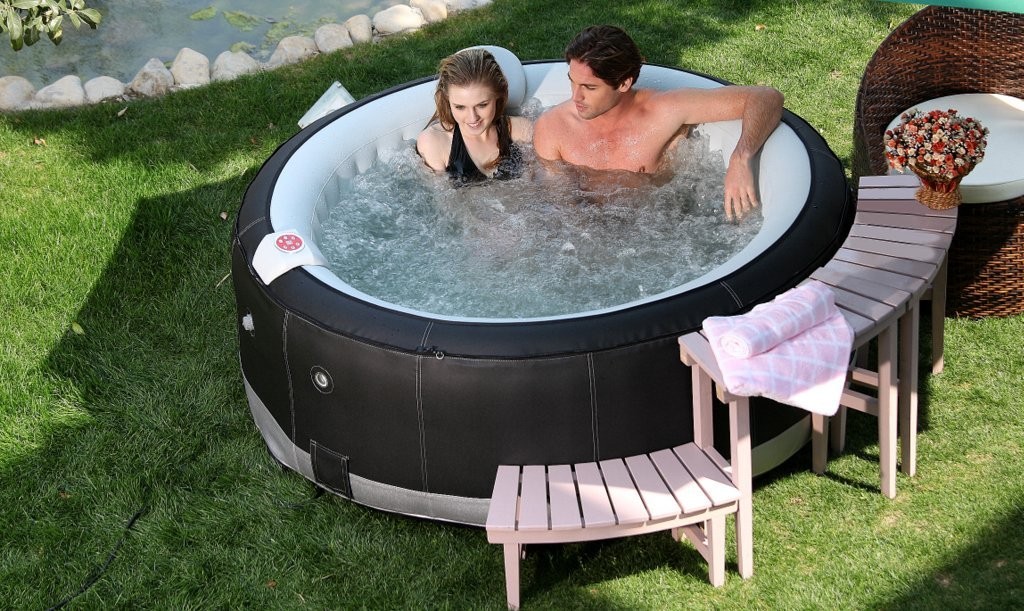Are inflatable hot tubs worth it? If you’re considering transforming your backyard into a relaxing retreat, inflatable hot tubs are a budget-friendly, space-saving, and increasingly popular alternative to traditional hard-shell models. Whether you’re tight on space, watching your wallet, or want something temporary, inflatable hot tubs may just be the perfect solution. But are they really worth the investment?
What is an inflatable hot tub?
An inflatable hot tub, also known as a portable spa, is a type of hot tub made from durable, inflatable materials like PVC or vinyl. These tubs are designed for easy setup and portability, allowing users to enjoy a relaxing hot water soak in various locations. They typically include a pump for inflation, water heating, and jet massage features.
This in-depth guide will walk you through the benefits, functionality, maintenance, energy efficiency, and long-term value of inflatable hot tubs to help you decide if they’re right for your lifestyle.
Table of Contents
Are inflatable hot tub worth it: Factors to consider
Construction & Functionality: Built Tough for Comfort
Modern inflatable hot tubs—like those from Relxtime, Intex, or Coleman—are made from reinforced, UV-resistant PVC or laminated vinyl materials, built to handle regular use and outdoor exposure. Models such as the Relxtime Inflatable Hot Tub feature four-ply, puncture-resistant walls that not only provide strength but also excellent insulation and comfort.
The inflatable structure supports built-in hydro jet systems, offering a genuine spa-like experience. Most models combine the pump, heater, filter, and control panel into a single compact unit for convenience.


Easy Setup & User-Friendly Operation
Setting up an inflatable hot tub is surprisingly simple:
- No professional installation required
- Just unbox, inflate (with the included spa pump), and fill with a garden hose
- Plug it into a standard 110V outlet
Within hours, you’ll be soaking in heated water. Most hot tubs come with intuitive digital control panels that let you:
- Adjust water temperature
- Activate jets
- Set timers
- Control filtration and heating cycles
Perfect for first-time buyers or renters looking for an easy-to-manage option.

Maintenance: Low Commitment, High Reward
Maintaining an inflatable hot tub is relatively easy:
- Drain & refill every 2–3 months
- Replace the filter regularly (usually monthly)
- Use water treatment chemicals to balance pH and prevent bacteria
Pro tip: Choose a model with a convenient side drain valve to make emptying quick and mess-free.
Because they’re lightweight and portable, inflatable tubs can be packed away during off-seasons, protecting the unit and saving space.
Affordability: Big Spa Feel, Small Price Tag
Traditional hot tubs can cost $3,000–$15,000+ with installation and maintenance.
In contrast, inflatable hot tubs typically range from $300 to $900, making them an excellent low-risk entry point into spa ownership.
Plus, the operational costs—especially for models with timers and eco modes—are significantly lower thanks to:
- Reduced water capacity
- Smaller heating elements
- Energy-efficient insulation
Looking for a budget pick? The Intex PureSpa and Coleman SaluSpa lines are top-rated for performance and value.
Placement & Environmental Suitability
Choosing the right location is key:
- Must be on a flat, level surface (concrete, deck, or reinforced patio)
- Near an outdoor power outlet and garden hose
- Avoid areas with excessive debris or overhead tree cover
Cold Weather Warning: Most inflatable hot tubs should not be used below 39°F (4°C) unless they’re rated for all-season use. However, winter-capable models do exist with freeze protection technology.
Energy Use & Efficiency: What to Expect
Inflatable hot tubs do use electricity to maintain temperature, but many modern models include:
- Insulated covers
- Ground cloths or thermal mats
- Timer-based heating
- Energy-saving modes
For best efficiency, always keep the cover on when not in use and preheat during off-peak hours.
Lifespan & Value: Is It Built to Last?
With proper care, an inflatable hot tub can last between 3 to 7 years. While this is shorter than traditional hot tubs, the lower price point, portability, and minimal upkeep make them a great value.
They’re ideal for:
- Renters or temporary living spaces
- Families testing hot tub ownership
- Seasonal spa enjoyment
- Backyard upgrades without construction
Final Verdict: Are Inflatable Hot Tubs Worth It?
Yes — inflatable hot tubs are absolutely worth it for homeowners or renters seeking an affordable, easy-to-use, and relaxing backyard spa experience. With the right model and proper care, they deliver excellent comfort, stress relief, and entertainment value without breaking the bank.
Ready to Shop Inflatable Hot Tubs?
Browse our top-rated models like the Intex PureSpa, Relxtime Greywood, and Avenli London. All feature fast setup, durable design, and affordable luxury—perfect for relaxing evenings and weekend getaways in your own backyard.
Inflatable Hot tub Related FAQs
How long does it take to heat an inflatable hot tub?
Most models take 12–24 hours to heat up to 104°F depending on outside temperature and water volume.
Can you use an inflatable hot tub indoors?
Yes, but only in well-ventilated areas with water-resistant flooring and proper drainage.
Can inflatable hot tubs be used in winter?
Only certain models. Most inflatable hot tubs shouldn’t be used below 39°F, but some brands offer winter-rated designs.
How often should I change the water in my inflatable hot tub?
Typically every 8–12 weeks, or sooner if the water becomes cloudy or develops an odor.



